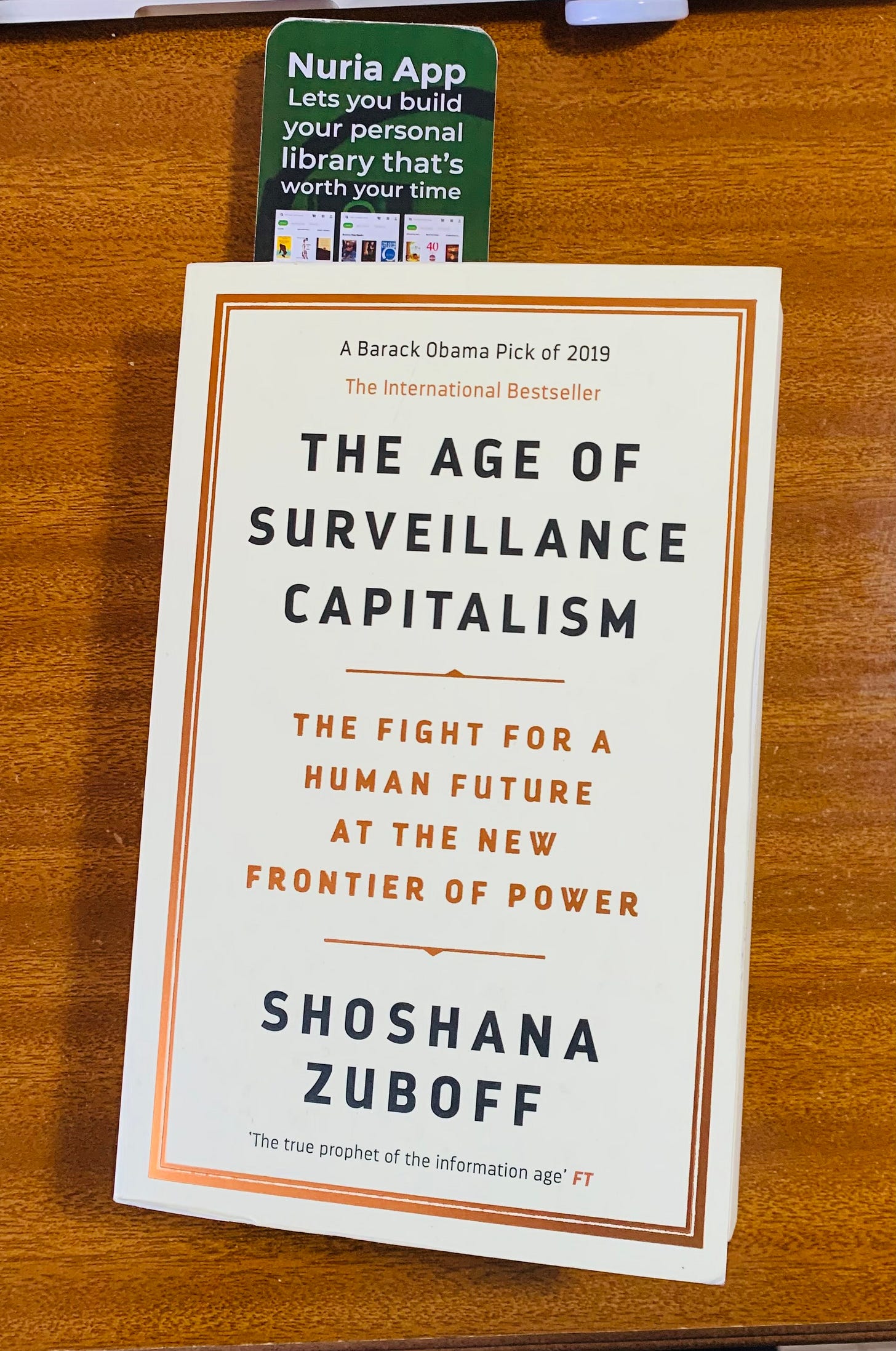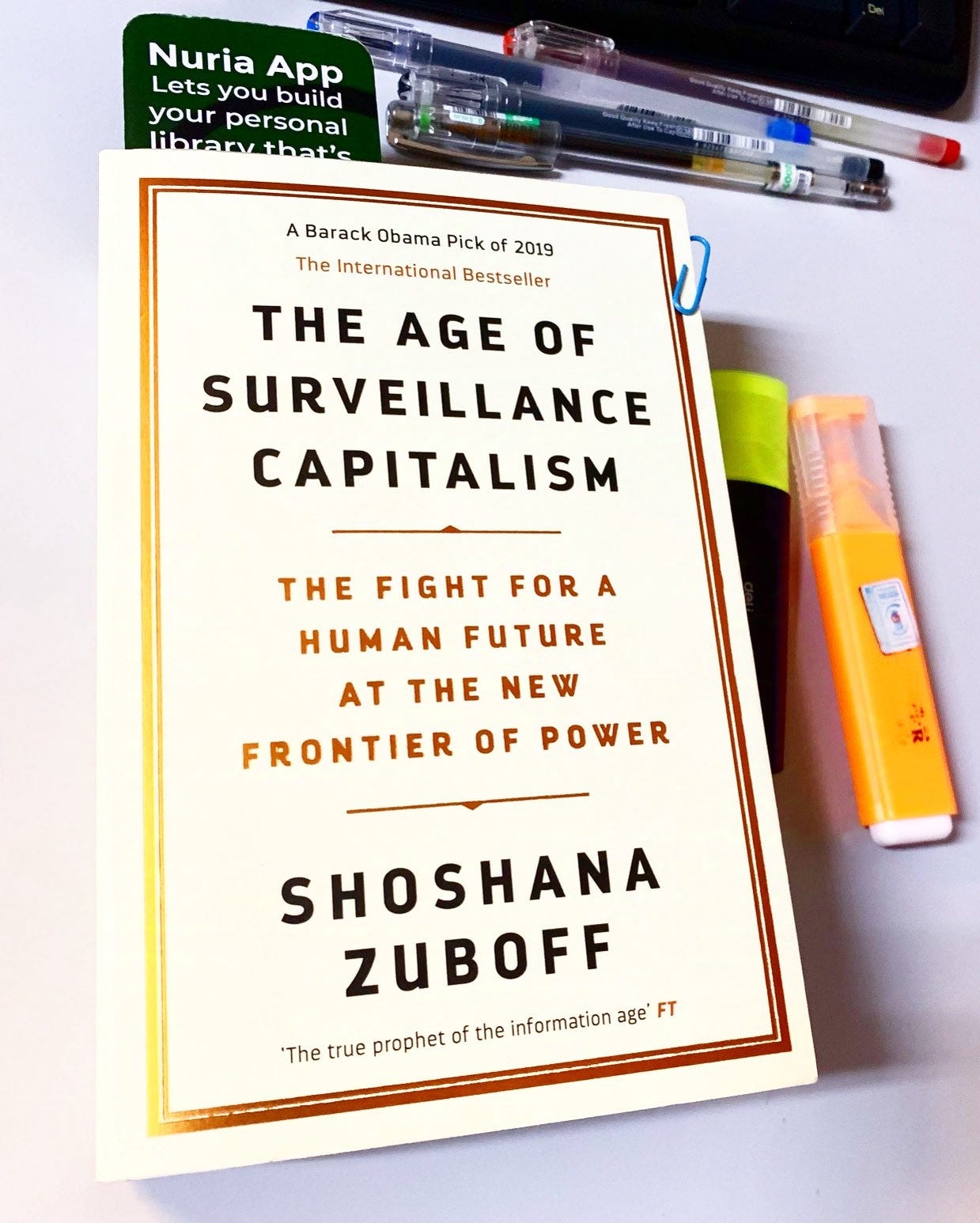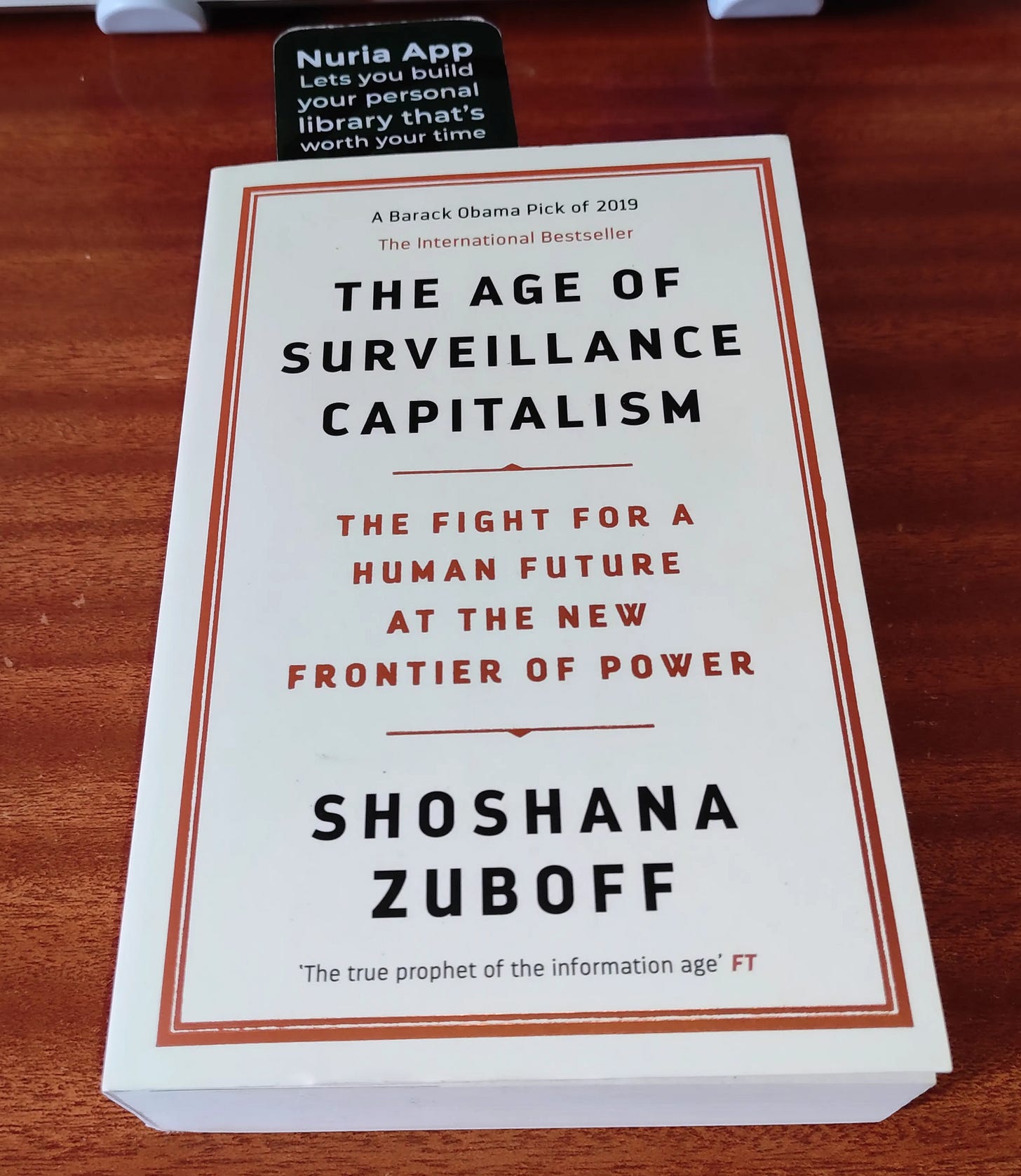𝐓𝐡𝐞 𝐀𝐠𝐞 𝐨𝐟 𝐒𝐮𝐫𝐯𝐞𝐢𝐥𝐥𝐚𝐧𝐜𝐞 𝐂𝐚𝐩𝐢𝐭𝐚𝐥𝐢𝐬𝐦: 𝐓𝐡𝐞 𝐅𝐢𝐠𝐡𝐭 𝐟𝐨𝐫 𝐚 𝐇𝐮𝐦𝐚𝐧 𝐅𝐮𝐭𝐮𝐫𝐞 𝐚𝐭 𝐭𝐡𝐞 𝐍𝐞𝐰 𝐅𝐫𝐨𝐧𝐭𝐢𝐞𝐫 𝐨𝐟 𝐏𝐨𝐰𝐞𝐫 .
𝒃𝒚 𝑺𝒉𝒐𝒔𝒉𝒂𝒏𝒂 𝒁𝒖𝒃𝒐𝒇𝒇
I have finally finished reading Shoshana Zuboff’s epic book, 𝐓𝐡𝐞 𝐀𝐠𝐞 𝐨𝐟 𝐒𝐮𝐫𝐯𝐞𝐢𝐥𝐥𝐚𝐧𝐜𝐞 𝐂𝐚𝐩𝐢𝐭𝐚𝐥𝐢𝐬𝐦. I commenced reading this book on Saturday, 3rd August 2024 at 1233Hrs. It’s the longest I ever read. Completed reading the book on Saturday, 16th November 2024 at 1701Hrs.
It’s an impressive work that ties together a lot of trends into a very spooky picture of where we are headed when intimate data about each of us is used as the raw material for prediction and control.
What began as a search and social platform without a substantial business model transformed due to the accidental discovery of the immense value of the data trails we leave behind when we go online—what is referred to as "behavioral surplus." The more we engage online, the more these companies understand our behaviors. This understanding allows them to sell predictions of our actions to those who wish to influence or modify our behavior.
The saying about free platforms—that if it's free, you are the product—is not entirely accurate. You are not merely the product; rather, you are the source of the raw material being extracted. This extraction serves not just to sell advertisements but also to equip those who profit from them with tools for controlling our behavior.
Google sent camera-equipped cars into our neighborhoods to capture images of our communities and create detailed maps. These maps will be useful for routing self-driving cars and even planning entire cities where everything is interconnected. Additionally, they aim to render individuals' life experiences as data, moment by moment.
As Zuboff explains, “It’s not the car; it’s the behavioral data from driving the car. It’s not the map; it’s the behavioral data from interacting with the map. The goal here is to continuously expand the borders that describe the world and everything in it, all the time.”
We often view this as an invasion of personal privacy, but for Zuboff, it represents a stealthy takeover of our freedoms. By inserting themselves into our lives and keeping their operations and goals hidden, these capitalists use various interventions to “nudge, tune, herd, manipulate, and modify behavior” in specific ways. This can be as subtle as inserting a particular phrase into your Facebook news feed, timing the appearance of a “BUY” button on your phone, or even shutting down your car engine when an insurance payment is late. As they introduce wearable devices, smart homes, and smart cities designed to capture and utilize data, we will find no place to escape. We will be constantly nudged toward behaviors that lack intrinsic values, echoing the concerns that arose when B.F. Skinner initially advocated for such modifications.
Zuboff is particularly outraged because this form of capitalism does not involve the sharing of benefits and risks. These companies not only observe the invisible forces at work, but they also manipulate these forces for their gain. In doing so, they exert control over us, which she describes as “a coup from above.”
Surveillance capitalism differs from industrial capitalism in that it profits not from the exploitation of natural resources and labor but from the collection, processing, and analysis of behavioral data. This is achieved through 'instrumentarian' methods that foster 'radical indifference'—a form of observation without a witness. Surveillance capitalists discovered an untapped source of information through the internal analytics and programming of their services. They recognized an opportunity to sell this 'data exhaust' to advertisers. For these companies, the individuals connected to this data are merely accessories.
In her writing, Zuboff frequently compares the concept of instrumentarianism in surveillance capitalism to the totalitarianism described by Hannah Arendt in *The Origins of Totalitarianism*. She draws parallels between the way surveillance capitalists chart cyberspace and Arendt's analysis of British imperialism as a precursor to totalitarianism. However, Zuboff ultimately argues that they are not equivalent; totalitarianism emerges from the state, while instrumentarianism stems from corporations.
Nevertheless, given the numerous public-private partnerships today, it’s debatable whether these distinctions are as clear-cut as she suggests. Consequently, Zuboff expresses greater concern about corporate surveillance than government surveillance. Her critique implies that these surveillance companies often begin to resemble a tyrannical, authoritarian state.
Zuboff describes the resulting economic structures as completely unprecedented, characterizing them as a form of "rogue capitalism." In the past, companies depended on the original sin of "primitive accumulation." In contrast, surveillance companies like Facebook and Google engage in a constant process of "digital dispossession." We are continually made understandable and profitable for these companies.
Zuboff expresses concern that, rather than merely using government surveillance to suppress free will, these surveillance companies may exploit human free will to achieve their own goals. They remain indifferent to us while simultaneously relying on the predictable outcomes that we provide.
Zuboff argues that companies like Facebook and Google have monopolized their public perception, which enables them to operate as they do. Their practices are concealed within proprietary closed-source code, and they often employ non-disclosure agreements and vertical organizational structures to obscure their activities. Additionally, they recruit academics from universities to bolster their efforts. The CEOs of major surveillance companies typically hold significant shares in their firms, allowing them to direct their companies as they see fit. This internal division of information makes it difficult for anyone other than the surveillance capitalists themselves to offer authoritative insights into their operations.
Zuboff critiques behaviorism and surveillance capitalism for undermining our sense of personal sovereignty. However, she also envisions a brave, collective resistance to surveillance capitalism. This raises the question: how does the concept of the sovereign self function in a collective context? It is challenging to understand how democratic processes, which require us to adhere to the will of others to some extent, can escape the individualistic criticisms that Zuboff makes against surveillance capitalism. This aspect is not adequately addressed by Zuboff, and such subtle contradictions ultimately weaken her overall message. She argues that surveillance capitalism is unprecedented and unlike ideologies such as totalitarianism and behaviorism, yet she frequently draws comparisons to both. Although she opposes determinism and ‘inevitabilism,’ her historical analysis is shaped by descriptions of ideology.
𝐙𝐮𝐛𝐨𝐟𝐟 𝐜𝐨𝐧𝐜𝐥𝐮𝐝𝐞𝐬, “𝐈𝐟 𝐝𝐞𝐦𝐨𝐜𝐫𝐚𝐜𝐲 𝐢𝐬 𝐭𝐨 𝐛𝐞 𝐫𝐞𝐩𝐥𝐞𝐧𝐢𝐬𝐡𝐞𝐝 𝐢𝐧 𝐭𝐡𝐞 𝐜𝐨𝐦𝐢𝐧𝐠 𝐝𝐞𝐜𝐚𝐝𝐞𝐬, 𝐢𝐭 𝐢𝐬 𝐮𝐩 𝐭𝐨 𝐮𝐬 𝐭𝐨 𝐫𝐞𝐤𝐢𝐧𝐝𝐥𝐞 𝐭𝐡𝐞 𝐬𝐞𝐧𝐬𝐞 𝐨𝐟 𝐨𝐮𝐭𝐫𝐚𝐠𝐞 𝐚𝐧𝐝 𝐥𝐨𝐬𝐬 𝐨𝐯𝐞𝐫 𝐰𝐡𝐚𝐭 𝐢𝐬 𝐛𝐞𝐢𝐧𝐠 𝐭𝐚𝐤𝐞𝐧 𝐟𝐫𝐨𝐦 𝐮𝐬…𝐭𝐡𝐞 𝐡𝐮𝐦𝐚𝐧 𝐞𝐱𝐩𝐞𝐜𝐭𝐚𝐭𝐢𝐨𝐧 𝐨𝐟 𝐬𝐨𝐯𝐞𝐫𝐞𝐢𝐠𝐧𝐭𝐲 𝐨𝐯𝐞𝐫 𝐨𝐧𝐞’𝐬 𝐨𝐰𝐧 𝐥𝐢𝐟𝐞 𝐚𝐧𝐝 𝐚𝐮𝐭𝐡𝐨𝐫𝐬𝐡𝐢𝐩 𝐨𝐟 𝐨𝐧𝐞’𝐬 𝐞𝐱𝐩𝐞𝐫𝐢𝐞𝐧𝐜𝐞”. 𝐖𝐞 𝐬𝐡𝐨𝐮𝐥𝐝 𝐜𝐞𝐫𝐭𝐚𝐢𝐧𝐥𝐲 𝐡𝐞𝐞𝐝 𝐡𝐞𝐫 𝐰𝐚𝐫𝐧𝐢𝐧𝐠. 𝐖𝐡𝐢𝐥𝐞 𝐭𝐡𝐞 𝐢𝐝𝐞𝐚 𝐨𝐟 𝐛𝐞𝐢𝐧𝐠 𝐜𝐨𝐧𝐭𝐫𝐨𝐥𝐥𝐞𝐝 𝐛𝐲 𝐥𝐚𝐫𝐠𝐞 𝐜𝐨𝐫𝐩𝐨𝐫𝐚𝐭𝐢𝐨𝐧𝐬 𝐢𝐬 𝐚𝐥𝐚𝐫𝐦𝐢𝐧𝐠, 𝐭𝐡𝐞 𝐢𝐦𝐦𝐞𝐝𝐢𝐚𝐭𝐞 𝐜𝐨𝐧𝐜𝐞𝐫𝐧 𝐢𝐬 𝐝𝐞𝐦𝐚𝐧𝐝𝐢𝐧𝐠 𝐭𝐡𝐚𝐭 𝐭𝐡𝐞𝐲 𝐚𝐝𝐝𝐫𝐞𝐬𝐬 𝐭𝐡𝐞 𝐥𝐚𝐰𝐥𝐞𝐬𝐬 𝐛𝐞𝐡𝐚𝐯𝐢𝐨𝐫 𝐭𝐡𝐞𝐲 𝐡𝐚𝐯𝐞 𝐞𝐧𝐜𝐨𝐮𝐫𝐚𝐠𝐞𝐝.𝐖𝐞 𝐦𝐮𝐬𝐭 𝐟𝐢𝐧𝐝 𝐭𝐡𝐞 𝐜𝐢𝐯𝐢𝐜 𝐰𝐢𝐥𝐥 𝐚𝐧𝐝 𝐧𝐞𝐜𝐞𝐬𝐬𝐚𝐫𝐲 𝐦𝐞𝐚𝐧𝐬 𝐭𝐨 𝐢𝐧𝐬𝐢𝐬𝐭 𝐭𝐡𝐚𝐭 𝐭𝐡𝐞𝐲 𝐜𝐚𝐫𝐞 𝐚𝐛𝐨𝐮𝐭 𝐭𝐡𝐞 𝐜𝐨𝐧𝐬𝐞𝐪𝐮𝐞𝐧𝐜𝐞𝐬 𝐨𝐟 𝐭𝐡𝐞𝐢𝐫 𝐩𝐨𝐰𝐞𝐫𝐟𝐮𝐥 𝐭𝐨𝐨𝐥𝐬 𝐨𝐟 𝐩𝐞𝐫𝐬𝐮𝐚𝐬𝐢𝐨𝐧, 𝐰𝐡𝐢𝐜𝐡 𝐜𝐚𝐧 𝐛𝐞 𝐮𝐬𝐞𝐝 𝐢𝐧𝐝𝐢𝐬𝐜𝐫𝐢𝐦𝐢𝐧𝐚𝐭𝐞𝐥𝐲 𝐛𝐲 𝐚𝐧𝐲𝐨𝐧𝐞 𝐰𝐡𝐨 𝐥𝐞𝐚𝐫𝐧𝐬 𝐭𝐨 𝐦𝐚𝐧𝐢𝐩𝐮𝐥𝐚𝐭𝐞 𝐭𝐡𝐞𝐦—𝐰𝐡𝐞𝐭𝐡𝐞𝐫 𝐬𝐭𝐚𝐭𝐞 𝐚𝐜𝐭𝐨𝐫𝐬 𝐨𝐫 𝐜𝐨𝐫𝐩𝐨𝐫𝐚𝐭𝐞 𝐨𝐰𝐧𝐞𝐫𝐬.
As I read, I became increasingly dismayed by how her research translated to the page. Make no mistake: the dangers of surveillance capitalism are both real and coherent, and I appreciate the attention that 𝐓𝐡𝐞 𝐀𝐠𝐞 𝐨𝐟 𝐒𝐮𝐫𝐯𝐞𝐢𝐥𝐥𝐚𝐧𝐜𝐞 𝐂𝐚𝐩𝐢𝐭𝐚𝐥𝐢𝐬𝐦 has brought to the issue of systematic corporate surveillance. However, cautionary works like this often walk a fine line between encouraging action and causing inaction. I worry that for many readers, 𝐓𝐡𝐞 𝐀𝐠𝐞 𝐨𝐟 𝐒𝐮𝐫𝐯𝐞𝐢𝐥𝐥𝐚𝐧𝐜𝐞 𝐂𝐚𝐩𝐢𝐭𝐚𝐥𝐢𝐬𝐦 will lean more towards the latter. While it provides a solid historical context, it ultimately falls short of a rallying call for change.
I enjoyed every page of this book.
Heartfelt gratitude to Bennet Owuonda at Nuria Bookstore for the honor with the book 𝐓𝐡𝐞 𝐀𝐠𝐞 𝐨𝐟 𝐒𝐮𝐫𝐯𝐞𝐢𝐥𝐥𝐚𝐧𝐜𝐞 𝐂𝐚𝐩𝐢𝐭𝐚𝐥𝐢𝐬𝐦 earlier year 2024.
I give it a 6-star review.








Nothing is for free 🤔